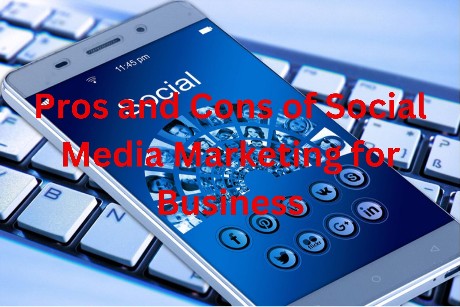Navigating the Social Media Landscape: Pros and Cons for Business Marketing
Social media has become an integral part of modern marketing strategies, offering businesses unprecedented opportunities for engagement and brand exposure. However, like any tool, social media marketing comes with its own set of advantages and challenges. In this exploration, we’ll delve into the pros and cons of leveraging social media for business marketing.

I. Pros of Social Media Marketing
1. Global Reach and Brand Exposure:
Advantage: Social media platforms provide businesses with a global stage, allowing them to reach a diverse audience and enhance brand visibility.
2. Cost-Effective Marketing:
Advantage: Compared to traditional advertising, social media marketing often proves more cost-effective, making it accessible for businesses of all sizes.
3. Audience Engagement and Interaction:
Advantage: Direct engagement with the audience fosters relationships and builds brand loyalty, as businesses can respond to feedback and inquiries in real-time.
4. Data Analytics and Targeting:
Advantage: Robust analytics tools enable businesses to track performance, understand audience behavior, and refine marketing strategies for more targeted campaigns.
5. Content Virality and Shareability:
Advantage: Engaging content has the potential to go viral, reaching a broader audience organically through likes, shares, and comments.
II. Cons of Social Media Marketing
1. Time-Consuming Management:
Challenge: Effectively managing social media accounts demands time and consistency, posing a challenge for businesses with limited resources.
2. Negative Feedback and Reputation Risks:
Challenge: Negative comments or feedback can spread quickly on social media, potentially harming a business’s reputation if not addressed promptly and effectively.
3. Algorithm Changes and Organic Reach Decline:
Challenge: Platforms frequently update algorithms, impacting organic reach. Businesses may need to invest in paid advertising to maintain visibility.
4. Dependency on Platform Policies:
Challenge: Businesses are subject to platform policies, and changes in these policies can affect marketing strategies and visibility.
5. Potential for Information Overload:
Challenge: The constant stream of information on social media can lead to content saturation, making it challenging for businesses to stand out.
III. Striking a Balance for Effective Social Media Marketing
1. Consistent and Strategic Presence:
Recommendation: Businesses should maintain a consistent and strategic presence on platforms relevant to their audience, balancing quality with quantity.
2. Proactive Reputation Management:
Recommendation: Implement robust strategies for reputation management, addressing negative feedback promptly and showcasing positive aspects of the brand.
3. Adaptation to Platform Changes:
Recommendation: Stay informed about platform algorithm changes and be prepared to adapt marketing strategies accordingly.
4. Diversification of Marketing Channels:
Recommendation: Diversify marketing efforts across multiple channels to mitigate the impact of changes on a single platform.
5. Value-Centric Content Creation:
Recommendation: Focus on creating valuable and shareable content that resonates with the target audience, enhancing the likelihood of organic reach.
IV. Harnessing the Power of Social Media
Social media marketing remains a potent force for businesses, offering unparalleled opportunities for growth and engagement. By understanding and navigating the pros and cons, businesses can develop strategies that harness the power of social media while effectively addressing the challenges that come with it.
